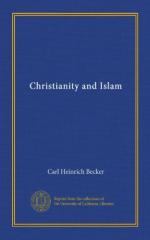Christian scholasticism was first based upon fragments of Aristotle and chiefly inspired by Neo-Platonism: through the Arabs it became acquainted with almost the whole of Aristotle and also with the special methods by which the Arabs approach the problem of this philosophy. To give any detailed account of this influence would be to write a history of mediaeval philosophy in its relation to ecclesiastical doctrine, a task which I feel to be beyond my powers. I shall therefore confine myself to an abstract of the material points selected from the considerable detail which specialists upon the subject have collected: I consider that Arab influence during the first period is best explained by the new wealth of Greek thought which the Arabs appropriated and transmitted to Europe. These new discoveries were the attainments of Greece in the natural sciences and in logic: they extended the scope of dialectic and stimulated the rise of metaphysical theory: the latter, in combination with ecclesiastical dogma and Greek science, became such a system of thought as that expounded in the Summa of Thomas Aquinas. Philosophy remained the handmaid of religion and Arab influence first served only to complete the ecclesiastical philosophy of life.
Eventually, however, the methods of interpretation and criticism, peculiar to the Arabs when dealing with Aristotle became of no less importance than the subject matter of their inquiries. This form of criticism was developed from the emphasis which Islam had long laid upon the value of wisdom, or recognition of the claims of reason. Muhammedan tradition is full of the praises of wisdom, which it also originally regarded as the basis of religion. Reason, however, gradually became an independent power: orthodoxy did not reject reason when it coincided with tradition, but under the influence of Aristotelianism, especially as developed by Averroes, reason became a power opposed to faith. The essential point of the doctrine was that truth was twofold, according to faith and according to reason. Any one who was subtle enough to recognise both kinds of truth could preserve his orthodoxy: but the theory contained one great danger, which was immediately obvious to the Christian church. The consequent struggle is marked by the constant connection of Arab ideas with the characteristic expressions of Christian feeling; these again are connected with the outset of a new period, when the pioneers of the Renaissance liberate the West from the chains of Greek ecclesiastical classicism, from Oriental metaphysical religion and slowly pave the way for the introduction of Germanic ideals directly derived from true classicism. Not until that period does the West burst the bonds in which Orientalism had confined it.
Christianity and Islam then stand upon an equal footing in respect both of intellectual progress and material wealth. But as the West emerges from the shadow-land of the middle ages the more definite becomes its superiority over the East. Western nations become convinced that the fetters which bind them were forged in the East, and when they have shaken off their chains, they discover their own physical and intellectual power. They go forth and create a new world, in which Orientalism finds but scanty room.




